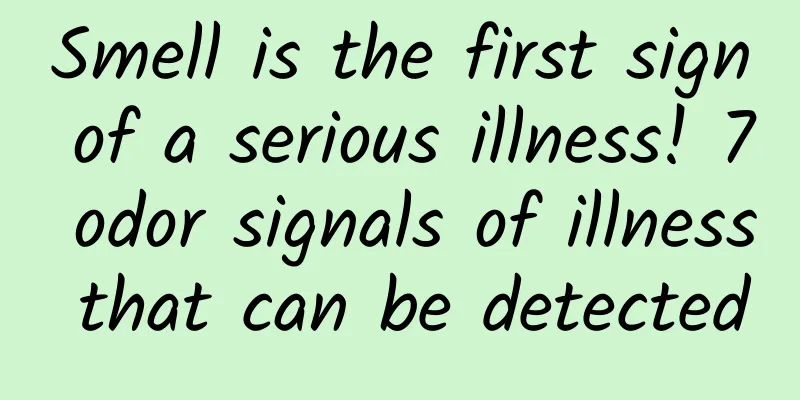Smell is the first sign of a serious illness! 7 odor signals of illness that can be detected

|
A comatose male patient in his 30s was sent to the emergency room. He was found to have been unconscious for 2 hours, had no previous medical history, had deep and heavy breathing, could smell like rotten apples, and his blood sugar was so high that it could not be measured . After the doctor conducted relevant examinations, he found that the venous blood sugar was as high as 48mmo/L, the urine routine test showed urine sugar ++++, urine ketone +++, and the pH value in the blood gas analysis was 6.93, indicating that the young patient had diabetic ketoacidosis . After the medical staff immediately gave him fluids and eliminated ketones, the patient's consciousness gradually became clear and his blood gas acidosis was corrected. After inquiring about the patient's medical history, it was discovered that the patient worked in IT, had an irregular diet, and liked to overeat when under stress, especially high-calorie foods such as cola and fried chicken. Doctors remind us: In recent years, it is not uncommon to see young patients in their 30s who present to the emergency room with the first onset of diabetic ketoacidosis. Some young patients experience nausea and vomiting after eating, and come to the hospital for treatment a few days later. They originally thought that they had just eaten something bad, so they didn't take it too seriously, thinking that taking some antibiotics or stomach medicine would get better. However, they found that the symptoms did not improve, and even drinking water would cause vomiting. After going to the hospital for treatment, they found that they had diabetic ketoacidosis. Diabetic ketoacidosis is the most common and life-threatening acute complication of diabetes. It is clinically characterized by acute onset, rapid changes, and severe condition. In addition to symptoms such as nausea, vomiting, and rotten apple smell, patients also have obvious increases in blood sugar. Urinalysis tests can show positive urine sugar and ketone bodies. Once ketoacidosis occurs, you need to go to the hospital for emergency treatment in time, including the use of insulin, fluid replacement, correction of electrolyte imbalance, correction of acidosis, prevention and treatment of causes and complications, etc. Having a "smell" on your body is a very embarrassing thing. Many people will feel inferior because of this, become cautious in interpersonal communication, or even stop interacting with others. However, in fact, body odor is not just embarrassing. It may be closely related to the health of the body and may be an important warning sign of disease. The smell of the human body mainly comes from excrement, digestive system, urinary system, oral cavity, nasal cavity, etc. When there are problems in these parts, abnormal smells are most likely to be produced. Different smells indicate different diseases ! 01 Rotten apple smell - diabetes Rotten apple smell, common in patients with diabetic ketoacidosis. Diabetic ketoacidosis is an acute complication of diabetes. The gas exhaled by the patient will smell like rotten apples . It is mainly because under the influence of various inducements, diabetes has an obvious lack of insulin secretion or an inappropriate increase in glucose-raising hormones, resulting in high blood sugar and high blood ketones, causing dehydration and electrolyte imbalance, thus leading to metabolic acidosis. In addition to exhaling the smell of rotten apples, patients are also prone to gastrointestinal symptoms, and their breathing and consciousness may change, such as nausea, vomiting, dizziness, headache, etc. In severe cases, they may also suffer from coma, drowsiness, and impaired consciousness. If a diabetic patient smells like rotten apples, he or she must go to the endocrinology department of the hospital for treatment in time and must not be careless. 02 Sour smell – digestive system diseases The sour and bad smell is mainly caused by indigestion or gastrointestinal dysfunction. In addition, dental diseases can also cause sour mouth and bad breath. When the human body is infected by Helicobacter pylori or indigestion causes gastrointestinal inflammation, it is easy to cause bad breath . Helicobacter pylori infection has biological characteristics. Some patients will have a sour and rotten smell in their mouths after eating greasy and difficult to digest food, especially high-protein and high-fat food. If the patient has dysbacteriosis and indigestion, the food will over-ferment in the patient's body and produce more strong-smelling gases, and the patient will have bad breath. In addition, when the patient has stomach discomfort, the cardia between the stomach and esophagus relaxes, which can cause food from the stomach and duodenum to reflux into the esophagus and mouth, easily causing the patient to reflux acid, resulting in sour mouth and bad breath . In addition, if the patient has dental diseases, such as caries, periodontitis, etc. , there will be a certain degree of inflammation in the mouth, which will cause a sour and smelly taste in the mouth, and there may also be symptoms such as gum pain, redness and swelling; if it is caries, due to food residues remaining in the caries, it can cause sour mouth and bad breath, which usually requires treatment by filling or extraction. 03 Caramel flavor – maple syrup urine disease Caramel, also known as burnt sugar, is the most common odor experienced by people with maple syrup urine disease. Maple syrup urine disease, also known as branched-chain ketoaciduria, is a hereditary branched-chain amino acid metabolism disorder . Due to the congenital defect of branched ketoacid decarboxylase, the catabolism of branched amino acids is blocked. The urine and sweat have a special sweet smell of burnt maple syrup, hence the name . Maple syrup urine disease patients show slower physical, neurological and intellectual development than their peers. When the neonatal leucine concentration is >4 mg/dL, the urinary excretion of branched-chain keto acids should be further tested. The diagnosis can be confirmed by quantitative testing of amino acids and organic acids in the child's blood, urine or cerebrospinal fluid. 04 Putrid smell – upper respiratory tract disease A foul smell in the mouth often indicates upper respiratory tract diseases such as sinusitis, pharyngitis and tonsillitis. According to clinical statistics, rhinitis, sinusitis, pharyngitis and tonsillitis account for more than 75% of bad breath and are the primary causes of bad breath. There is a large amount of purulent secretions in the nasal cavity of patients with sinusitis. When the secretions accumulate in large quantities or the viscosity of the secretions is too high, they may flow downward and attach to the nasopharynx. The proteins and other substances in them are decomposed by bacteria into unpleasant gaseous compounds, which are discharged through the mouth, causing bad breath and emitting a corrupt smell. When sinusitis develops seriously or purulent fluid irritates, it may cause inflammation of other adjacent tissues, such as pharyngitis, tonsillitis, etc. The secretion of purulent substances by various glandular ducts may also cause bad breath. Therefore, when sinusitis patients have bad breath, they should strengthen nasal irrigation to remove the irritation of yellow purulent nasal discharge to the lower respiratory tract and oropharyngeal mucosa, which can effectively reduce bad breath. 05 Liver odor – liver disease When the patient exhales or observes the patient's urine, if you can smell a mixture of rotten apples and rotten eggs or a fishy odor with a fragrant sweet smell, it is liver odor . Hepatic odor is a special odor often exhaled by patients suffering from hepatitis or impaired liver function. The odor is mainly caused by severe liver damage. After digestion and bacterial action, methionine not only releases ammonia but also produces dimethyl sulfide and methyl mercaptan. The latter two are retained in the body and emit a special odor through breathing or urination. Hepatic stink is mostly caused by liver disease , which is usually related to the increase of thiol products in the blood and urine, such as hepatic encephalopathy, hepatitis or cirrhosis, primary liver cancer, renal failure, etc. 06 Urine smell – chronic kidney disease When the creatinine in the blood reaches the uremia stage, that is, it reaches 707μmol/mL , these patients can excrete some urea nitrogen and creatinine through the sweat glands, and a slight urine odor may appear, which is the smell of ammonia released after urea nitrogen and creatinine are decomposed by bacteria . If the treatment of kidney disease is not effective, renal failure will gradually occur. After the progression to stage 4-5 chronic renal failure and increased creatinine, a urine odor may appear in the breath , and corresponding odor manifestations will appear. If the patient's condition worsens further, the smell will become stronger and stronger until the patient enters uremia and undergoes dialysis treatment. The toxin level is cleared to a certain extent, and the corresponding smell will gradually decrease or disappear. Although patients with uremia may have a certain odor on their bodies, not everyone will have it. If the patient has a urine odor, do not take it lightly. 07 Ammonia smell - cystitis Usually, the ammonia smell of fresh urine becomes stronger and the symptoms are persistent, so the possibility of cystitis and urinary retention should be considered. The most common odor of urine is ammonia in patients with dysuria and urinary retention. When patients have acute or chronic urinary retention, infectious pathogenic microorganisms stimulate the decomposition of urea to produce ammonia, which causes a pungent ammonia odor in the urine. When the patient has symptoms of incomplete urination, it will stimulate the decomposition of urea and produce a large amount of ammonia. The patient will have a pungent ammonia odor when urinating. When the patient's urine smells like ammonia, he or she can go to the urology department for examination. The urine odor examination is one of the examination contents of urine properties . Usually, the odor examination provides a basis for the diagnosis of urological and non-urological diseases. References: [1] Li Meifang. Diabetic ketoacidosis is "targeting" young people[J]. Health Expo, 2023, 8:34-35. [2] Yang Jinkui. Diabetics should not be careless when they smell rotten apples[J]. Family Medicine (Happy Health), 2017, 11:51. [3] Zhan Yuan, Jiang Xiao. Study on the correlation between physique and bad breath[J]. Popular Science, 2017, 7:110-111. [4] Li Candong. Diagnosis of Traditional Chinese Medicine. 4th edition[M]. Beijing. China Traditional Chinese Medicine Press. 2016. [5] Gu Xuefan. Clinical Genetic Metabolic Diseases. 1st edition[M]. Beijing. People's Medical Publishing House. 2015. |
>>: The V-2 rocket that landed on the wrong planet
Recommend
Xu Huaxin of Discovery Media: Splash screen advertising is just the tip of the iceberg of OTT large-screen marketing
The "2017 China OTT Large Screen Marketing L...
Which company providing SEO optimization services in Pingliang is better? How to choose?
Nowadays, due to the increasing bidding costs, ma...
Are the high-end internet-famous vegetables really irreplaceable?
Nutrition, health and freshness are the current t...
Summer hibernation, winter hibernation...are there such lazy fish?
Here’s some fun fact for you: All vertebrates sle...
How to operate Tiktok with a novice hand, and earn US dollars from 0 to 10,000 followers in 3 days
So today such a course comes out! Course Catalog:...
Event planning: the underlying logic of events common to 360 industries
This article uses an interesting story in the for...
How can B-end designers maximize the value of design? Let’s take a look at the summary of JD experts!
At work, I need to teach some newcomers about B-s...
Is Kuaishou promotion useful? How to promote on Kuaishou?
After 7 years of accumulation, Kuaishou has becom...
The traffic of new car dealers has a bad smell. The big bosses of car companies have turned into young and handsome guys in a second, which is actually a disaster for users.
What was the hottest topic at the Beijing Auto Sh...
3 aspects to analyze the art of channel operation
In the Internet environment, it is said that traf...
What is "ear water imbalance"? Is this disease serious?
The disease of "ear water imbalance" ha...
What is the existence of a pig farming O2O project that is said to be valued at 1 billion US dollars?
[[153523]] Wang Dapeng was going to the countrysi...
Video websites betting on American dramas to revive may fail
In recent years, European and American dramas tha...
German PzH2000 self-propelled howitzer
Since the German Army received the first PzH2000 ...
The underlying logic of information flow advertising
In fact, when I first entered the industry, I onl...









